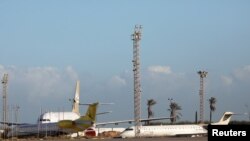Mitiga Airbase, Tripoli's main civilian and military airport, came under rocket attack by forces loyal to eastern military commander Gen. Khalifa Haftar Saturday, with some of its infrastructure and several passenger jets sustaining heavy damage.
The attack came as fighting between forces loyal to Haftar and the rival Tripoli-based government, each side targeting the other’s military bases, has intensified in recent days.
Amateur video showed thick plumes of black smoke rising over Mitiga Airbase Saturday after Haftar’s forces targeted it with dozens of Grad rockets.
The rival Tripoli-based government claimed that the base suffered heavy damage. A military spokesman for the government claimed that fuel storage tanks, fire trucks, several passenger jets and the civilian passenger terminal were damaged by the shelling. Haftar's forces claimed that military sections of the airport also suffered heavy damage.
Supporters of Tripoli's internationally-recognized prime minister, Fayez al Saraj, claimed that civilian areas near Mitiga Airport were also hit by the shelling, causing a number of civilian casualties. VOA could not independently confirm the claim.
Both sides have been attacking each other's strategic military bases in recent days, causing heavy damage and casualties. Forces loyal to Saraj have attacked Haftar’s al Wuthia Airbase near Libya’s border with Tunisia, while his forces have bombed bases controlled by Saraj's forces in Misrata and Tripoli.
Khattar Abou Diab, who teaches political science at the University of Paris, told VOA that both parties in Libya have "ignored calls by the U.N. secretary-general to observe a coronavirus cease-fire," and each side has stepped up attacks alongside their supporters.
He said that as Turkey steps up its support for the government in Tripoli, the Russian Wagner group, along with the United Arab Emirates, have increased their support for Haftar. He said Haftar controls much of the country and its resources, but it is unlikely that he can win a military victory.
Libya analyst Mohammed Fathi told Arab media that France and Italy are supporting opposing sides in Libya "due to their own national interests," while neighboring Arab states are also divided, with some opposing the Islamist-based government in Tripoli and others supporting it.
Qatar and Turkey support the Tripoli-based National Unity Government, while Egypt, the UAE, France, Saudi Arabia and Russia oppose it. The U.S. Embassy in Tripoli has called on all parties to "stop fighting and return to the negotiating table."






